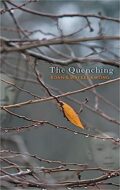
The Quenching
Bonnie Wai-Lee Kwong
Finishing Line Press
Reviewer: Vivian Wagner
The Quenching, by Bonnie Wai-Lee Kwong, is a study in translation between languages, cultures, and selves. Kwong opens the collection with an introduction meditating on this process: “Translational motion involves a body moving from one point in space to another. To carry across is to translate.” Translation is about movement, and the poems in this collection explore what it means to move and what is carried along and left behind in the process of moving.
The collection’s introduction tells stories of literal moves in the poet’s lifetime, from her birthplace in Wisconsin to Indiana, Connecticut, Hong Kong, Michigan, and New York. It also maps the psychology and emotionality of these moves, looking at the ways they embody and express her identity—both in the past and moving forward. As she says, “I offer a trajectory into a future through the sharing of ideas, through the senses, the body, and the mind.”
The poems in the collection often focus on the tension between movement and stasis, with the words in some poems, such as “locus,” scattering across the page as if they, too, are traveling:
there were times my young
mind
traveled
not with my body
but
with the
odyssey …
In this poem, the childhood self tries to make sense of physical and emotional journeys, and also of what the poem calls the “monsters / in fixed geographies.” To be fixed, it seems, is to be endangered, whereas to move is to find at least a temporary escape. The poem references Penelope in Homer’s The Odyssey, imagining an alternative future for her “swimming off / on her / journey.” Likewise, the speaker desires movement and change, even if they mean a loss of certainty.
In “The Cipher of Fireflies,” the speaker explores a Pennsylvania family and landscape that she’s married into:
I had married Bits’ son—
Bits, for Mommy’s itsy bitsy baby.
He played with metal puzzles
like twisted nails or paperclips askew.
The landscape is intertwined, she finds, with the people who live there: “The cold of this terrain could freeze / the arm of a semaphore.” This image refers to a literal freezing of the machinery involved in an early signaling method as well, it seems, as difficulties in communication in this culture. Her marriage, though, offers an opportunity for connection and intimacy:
I was married to a man who knew to kiss me
if I tilted my head at the slightest angle.
The cipher of fireflies starred the sky.
Ciphers, after all, only seem fixed; with enough effort, they can be translated. Meaning and emotion can start to move once the code’s been cracked.
“Spilled Rust” also explores a Pennsylvania landscape and the tension between movement and inertia:
Hours of starting and stopping. Inertia jolts.
An old highway, built, torn and rebuilt,
tapers into rural roads.
The highway becomes a metaphor for the starts and stops inherent in human relationships and communications. While traveling with her husband on the highway and arriving in a small, rural town, the speaker seems to have experienced a miscarriage: “the sudden emptying of my womb—spilled rust.” There’s no pharmacy to be seen, and “A confederate flag hangs / on the porch of an abandoned bank.” It’s a moment of loss, but also of movement, as blood leaves her body: “I can only wish for new roots / to bind the spent soil.” The intertwining of grief and forward motion is heartbreaking, and it illustrates a kind of bodily translation from one place to another.
“Semaphores” returns to the theme of signaling, looking at connections between the natural world and human culture: “If satellites fail, homing pigeons might map their return / by sounds too low for the human ear.” There’s hope, at least, that if human-made technologies break down, the natural world will continue signaling, performing its own computations and translations:
Change unfetters the wings of carrier pigeons—
to compute with the speed of light
patterns once punched on cards, braille-like,
to be read by mechanical looms.
Ultimately, the hope in this poem and in the collection as a whole is that free-flowing translation and communication can happen for humans in this natural state, as well—that beneath human technology, cultures, and languages flows a river of understanding. The speaker in this poem and others doesn’t offer up an unexamined universality as an answer to cultural disjunction, but she does suggest that noticing and sharing specific moments might lead to connection: “Paralyzed bodies can breathe messages in Morse. / I learn to listen.”
One of the primary metaphors in this collection is the act of quenching, and it’s explored fully in the eponymous poem, “The Quenching.” The process of quenching is itself a kind of translation—bringing matter into the body and making it part of oneself. “Quenching” refers to the act of drinking and eating, but also to the exchanges involved in living, observing, and reading:
Drink from the river of cloth.
Drink with cupped hands.
Drink from the sky above.
Drink, and let the sky be.
This poem offers a glimpse into a world in which the speaker lives, and also one that she’s imagining into being. She explores her family’s history and her own, even as she looks toward a future that’s growing out of that past. The movement through time is also a kind of translation, and through understanding and compassion the speaker begins to speak the language of that emerging future: “She lets go of letting go.” In the last stanza, she returns to the idea of sharing and communion, finding at last a way to move past moments of loss, grief, and disassociation: “On the shared thirst of this dry creek bed, / lay down a river of cloth.” She finds herself not in a fixed location, exactly, but rather in a space that accepts movement and flow, change and evolution, words and translation.

